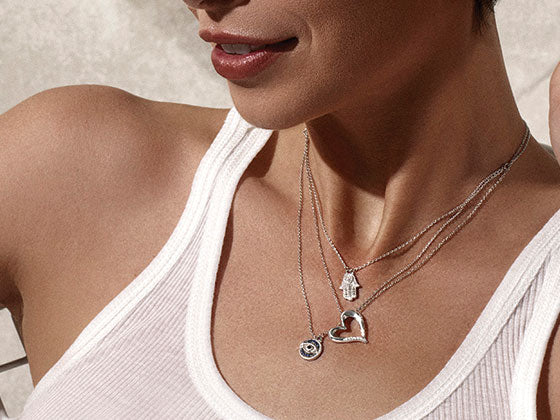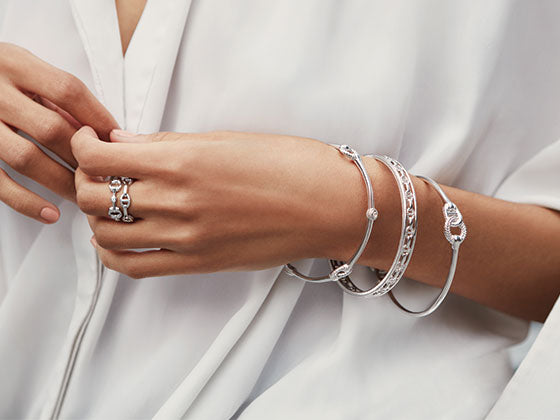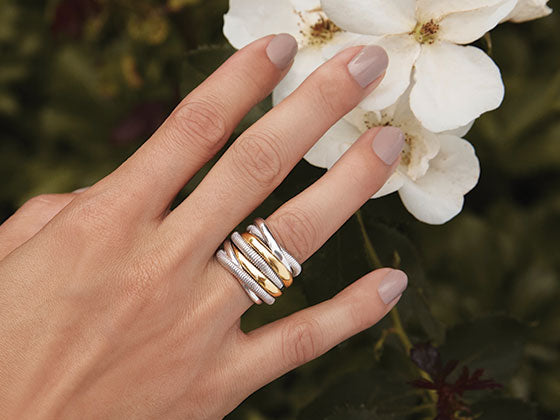Care & Repair
Judith Ripka jewelry is made with the utmost care and attention to detail. If cared for properly, it can be enjoyed for generations. Air pollutants, dust, perspiration, perfumes, cosmetics, and other natural elements can dull the appearance of gemstones or precious metals. Because of this, it is always good practice to wipe down your jewelry with a cotton cloth after wear.
Wait until you’ve applied your make-up, perfume, and hairspray before putting on your jewelry. Remove your jewelry before doing any household work. Never wear pearl earrings or necklaces when getting your hair colored. Store your jewelry in non-leather pouches, boxes, or zip lock bags. Make sure they are wrapped individually (in tissue or cloth) to avoid scratching.
If a piece is damaged, it should receive immediate attention for repair to prevent further damage or loss.
JUDITH RIPKA FINE JEWELRY
Need to resize your Judith Ripka ring or request a repair of your Judith Ripka jewelry? For your convenience, we offer our customers a link to a third party authorized repair center for online jewelry repairs. An estimate will be provided after your jewelry is inspected. Shipping and handling charges may apply. Approval is required before a repair can begin. If it is determined that your jewelry can not be repaired, or there are limitations, you will receive a detailed explanation via email.
We recommend insuring the package with a major shipping carrier (e.g. FedEx, UPS, USPS) and obtaining a tracking number for your records. Please pack repair items securely to prevent damage during transit. Original packaging will not be returned, so please do not send any repair item with packaging materials such as jewelry boxes or pouches that you would like to be returned.
ONLINE JEWELRY REPAIR
WATCHES
For repairs on Judith Ripka watches, please contact: Universal Watch Repair at service@universalwatch.net or call at (248) 723-5400.
QVC
For inquiries regarding Judith Ripka products purchased from QVC, please contact their customer service at http://www.qvc.com/CustomerService.content.html or call QVC at (888) 345-5788.
CLEANING GOLD AND PLATINUM
Before cleaning your jewelry, examine it carefully to make sure that all settings, clasps, and prongs are secure. Use a nonabrasive jewelry cleaner, which can be purchased at a local jewelry store, or a cleaning solution made of mild dish soap and warm water. Dip the jewelry in the cleaner or cleaning solution. Use a soft toothbrush to gently loosen any dirt. Rinse in warm running water and buff dry with a soft, lint free cloth until it is shiny.
CLEANING AND CARING FOR STERLING SILVER
Avoid exposing sterling silver to harsh chemicals such as chlorine, cosmetics, hair spray, and perfume. When cleaning sterling silver, use a phosphate-free detergent or low abrasive cleaner designed for cleaning silver. You can wash your jewelry periodically with mild dish soap and warm water. Make sure to rinse well and dry completely with a soft cloth before storing. Use silver polish to restore the finish and protect sterling silver from tarnishing. Store sterling silver jewelry in tarnish prevention cloths or bags that are treated to slow down the tarnishing process. It is also important to separate jewelry when being stored to avoid scratching. If you are not going to wear the piece for a long time, use small zip lock bags to keep it sealed and dry. Do not store the silver jewelry directly in contact with wood surfaces as wood may contain acids that can damage the finish.
CLEANING AND CARING FOR PEARLS
If a pearl necklace is worn regularly, the pearls will be in constant contact with the woman’s skin. This will result in the pearls gradually absorbing acid from the skin and the acid will slowly eat into the spherical pearl. Over time, the pearl will not only lose its luster, but will become barrel shaped. You can slow this process by wiping the pearls with a soft cloth after wearing them. Chemicals like perfume, vinegar, and lemon juice easily damage pearls and should not come in contact with pearls. Heat can turn pearls brown, dry them out, and make them crack. Dry air can also damage pearls. Most safe deposit vaults have very dry air and can damage pearls. After wearing pearls, wipe them off with a soft cloth or chamois, which may be dry or damp. This will prevent dirt from accumulating and will keep perspiration, which is slightly acidic, from eating away at the pearl nacre. You can even use a drop of olive oil on the cloth to help maintain luster. After washing your pearls, lay them flat in a moist kitchen towel to dry. When the towel is dry, your pearls should also be dry. Every six months the customer should have a jewelry professional verify that the pearls are securely mounted and that the string is still strong.
CLEANING STONES
To clean most stones, soak them in warm soapy water. Warm soapy water should not be used for the following stones: chalcedony, onyx, turquoise, coral. Do not use jewelry cleaner on pearls or porous stones such as lapis lazuli, coral, or turquoise. Emerald is a fragile, brittle stone that needs to be handled with special care. Wipe them clean with a soft damp cloth or have them cleaned professionally. Consult a jeweler when in doubt about a particular stone. It is recommended that you get your jewelry professionally cleaned periodically and have pearls restrung every few years, especially if you wear them often.
CLEANING DOUBLETS
Doublets should be cleaned carefully with clear detergent, a toothbrush, and warm water. These stones should not be exposed to heat, harsh detergents, ammonia based cleaners, oils, or cleaners containing alcohol. They should not be worn while in the shower, immersing hands in hot water, or working with commercial cleaning compounds. They should not be steam cleaned or submerged in water.



